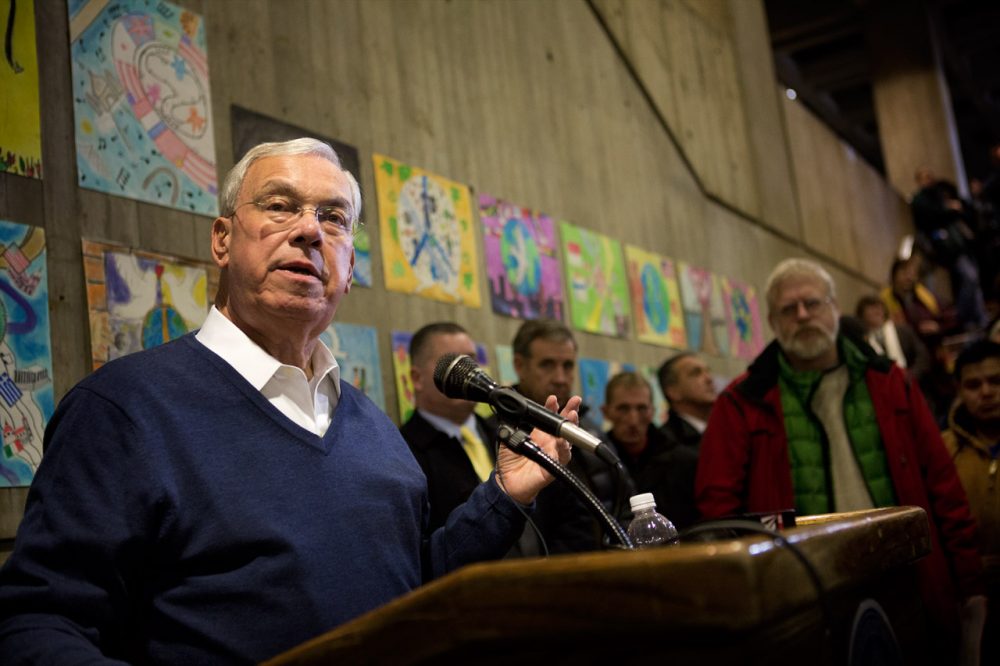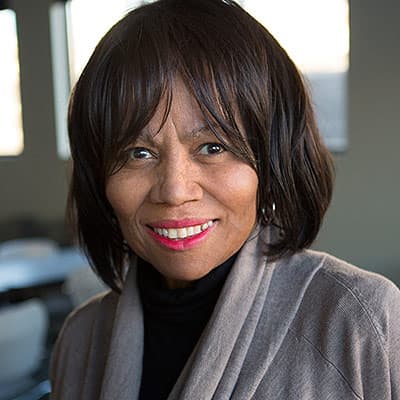Advertisement
Thomas Menino, A Boston Political Giant, Dies
Resume
Thomas Menino, the longest-serving mayor in Boston history, who guided the city for 20 transformative years, has lost his last battle.
Just after 9 a.m. Thursday morning, he "passed into eternal rest after a courageous battle with cancer," his spokeswoman, Dot Joyce, said in a statement. He was 71.
Thomas Michael Menino was a husband, a father, a grandfather; a lover of the city of Boston and the fact that he could change people's lives, just by being mayor.
He could be hard-nosed in pushing for what he felt was needed, including times during his last term, when he was determined to wield the power of his office, even if from a wheelchair.
Nowhere was that more obvious than during one of the darkest weeks in Boston's history.
On April 15, 2013, twin explosions near the finish line of the Boston Marathon claimed the lives of three people, crippled and maimed dozens more, sending scores to Boston-area hospitals, including the Brigham and Women's where Menino himself was a patient.
Days later, after being wheeled to the podium by his son Tommy Jr., Menino valiantly stood up, joining President Obama, Gov. Deval Patrick and 2,000 other mourners at a memorial service at The Cathedral of the Holy Cross.
"I knew what to do," Menino said. “'Tommy,' I said, 'I’m the mayor. Wheel me to the pulpit. I’m going to stand up.' "
His success as a politician might have seemed unlikely by some standards. He was not a gifted orator. But voters shrugged off his occasional mangling of a name or malapropism.
He said he wasn't elected because he was "a fancy talker." And he seemed not bothered by those who referred to him as "Mumbles Menino."
"Oh, it’s a wonderful name," he said. "Just think about it. I’m 'Mumbles' but I’ve been mayor for 20 years. No one else has been 'Mumbles' and mayor for 20 years."
As mayor, he recognized the power of his position, and he wasn't shy about using that power.
He once said, "This job, my legacy, is about the people." He saw himself as trying to make a difference, leveling the playing field in a city known as the cradle of liberty, a city like so many others which, despite great wealth, had far too many of its residents living on the margins.
Menino got his political start working in his own neighborhood, starting in the mid 1960s.
"Tom was an activist in Hyde Park. His family were activists," said former state Sen. Joseph Timilty, who first met the future mayor when Menino volunteered to work on Timilty's city council campaign.
"Even as a kid — 18-year-old kid when I first met him — he loved the business," Timilty said.
Menino later worked in Timilty's office on Beacon Hill and for all three of the state senator's unsuccessful efforts to unseat then-Boston Mayor Kevin White.
"His first love was politics," Timilty said. "Some people was baseball, some it was hockey. His was community service. His was politics. He loved it."
The son of Carl and Susan Menino, Thomas Menino was born in the Readville section of Boston's Hyde Park neighborhood. His father was a factory foreman who worked at Westinghouse Electric. His grandparents lived on the first floor of their home.
School was a tough experience for Menino, but he graduated from St. Thomas Aquinas High School in Jamaica Plain in 1960. He got a job working at a life insurance company and enrolled in night courses at Boston College before deciding that college was not for him.
Reportedly, when his father asked him about his reasons for quitting, the younger Menino said, "Truman didn't go to college." President Harry Truman was a personal hero of Menino's and Truman's portrait hung in Menino's office at Boston City Hall.
It was while he was a salesman for Metropolitan Life Insurance, with a sideline working in political campaigns, that he married Angela Faletra, the daughter of the owner of a diner in Roslindale. The two met on neighborhood tennis courts.
Until his death, the Meninos lived in a modest home in his Hyde Park neighborhood.
It took a while, but he eventually went back to college, getting first a junior college degree and then in the '80s, while serving on the city council, a bachelor's degree from UMass Boston.
While his introduction to politics was all the machinery of the operations, he himself was ripe for political office by the time the city switched from nine councilors elected citywide at-large, to a 13-member council with nine district councilors and four at-large members.
He ran in that first election in 1983 and was elected to the newly created 5th District seat, serving Hyde Park for nine years, sometimes running for re-election unopposed.
In 1993, he ran for city council president, the person who steps in in the absence of the mayor. A councilor from the 6th District, Maura Hennigan of Jamaica Plain, also ran.
Menino managed to get one more vote of support from his fellow councilors than Hennigan, and so Menino was president of the city council when President Bill Clinton appointed then-Boston Mayor Ray Flynn U.S. ambassador to the Vatican.
Menino was elevated to acting mayor on July 12, 1993.
The following November Menino beat out a field of eight candidates to win election to a four-year term. It was the first of what would become a record-setting five terms. He never lost an election, running five times as city councilor, five times as mayor.
"When he got in [to office]," Hennigan said, "there was really a lot of respect because he knew what he was doing and right away got involved in a lot of issues that were important to his district, but [also] to the city as a whole."
Former state Rep. Charlotte Golar Richie met Menino before she became an elected official and left the State House to join Menino's cabinet as chief of housing and neighborhood development.
"His first 10 years the slogan for his administration was 'Getting the job done'," she said.
Golar Richie says his leadership, even though it came years after the start of the city's school busing crisis, broke ground.
"[Menino] made the city a more open and accessible place," she said. "Mayor Menino had some hard work to do to make peace in the city. And he, I thought, did a lot to make this a more open place."
Even those who butted heads with him at City Hall agree on that.
Councilor Charles Yancey, representing the 4th District of Mattapan and parts of Dorchester, was often on the receiving end of Menino's sharp tongue. But he says 90 percent of the time he and Menino agreed on issues.
"I think Tom Menino will be recognized not only for helping to stabilize the finances of the city, which he did, not only for advocating clean air with regards to tobacco in the city," he said. "He also deserves credit for taking some out-of-the-box positions on controversial issues, like gay rights and particularly marriage equality. He deserves credit for that."
"There's the kind of cliché expression that the rising tide lifts all boats. But we know that that's not always true," said Boston businessman Jack Connors. "In Tom Menino's city it was more true than it was in many other cities around the country and around the world. Because if there was success, then Tom Menino wanted to be sure that the folks who didn't have a voice shared in that success."
Connors credits Menino for inspiring and for helping him create Camp Harborview, a summer camp for city kids on Long Island in Boston Harbor.
"This is a guy who cared more than almost anyone I've ever met about doing the right thing for folks who didn't have a voice," Connors said.
Menino's last few years in office were marked by illness. He was hospitalized more than a dozen times over two decades, starting in 1995 and 1996.
There were severed tendons in his knees, a broken foot, an upper respiratory infection, a compression fracture suffered in his spine while he was hospitalized, a diagnosis of diabetes.
He announced in March 2013 that he would not run for a sixth term. A month later, he twisted his ankle and fell, breaking his right leg.
In February of this year — just over a month after leaving office — he was diagnosed with an advanced form of cancer that had spread to his liver and lymph nodes.
His attitude remained upbeat. "We'll get through this," he said.
He went on a book tour promoting his autobiography, "Mayor for a New America."
In it, he writes with pride about the evolution of Boston, saying it was "broken up" racially when he assumed office, but has become a "much more inclusive city."
On Oct. 23, he announced that he was suspending his cancer treatment and book tour. He said he wanted to spend more time with family and friends as he continued to “fight this terrible disease.”
Before he left office, in December 2013, Menino spoke with WBUR's Bob Oakes:
I’m not a fancy guy, that’s for sure. But whatever I did I thought was the right thing for the young people, for the adults, for the business community. When you take the oath as mayor, you’re mayor of all the people. And how do you improve all of their lives, not some of their lives.
Thomas Michael Menino was Boston's first Italian-American mayor. His name is indelibly etched in the city's history. He was the 53rd mayor of one of America's oldest cities. He held that office longer than any other.
He is survived by his wife of 48 years, Angela, their two children, Thomas Jr. and Susan, and their six grandchildren.
